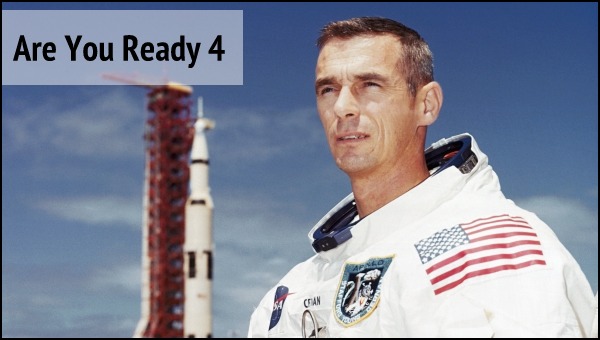By Tyson Thorne

For many around the world, astronauts are true life heroes – and for good reason. To become one of the few to lose the bounds of gravity means having what novelist Tom Wolfe called the “right stuff”. That includes a lot of education – most of them have advanced degrees (think doctorate level and, for some, even beyond) and experience to match. It also includes being in great physical shape, having near perfect vision, and you must be of a certain height (neither too short or tall). The right stuff seems to be the same stuff of super heroes.
These are remarkable men and women who have remarkable lives long before they make the trip to outer space. Floating in the vastness of the universe is amazing enough, but an even harder club to join is to land on another body. The last man on the moon was Eugene Cernan, and he left its soil back in 1972. Cernan died earlier this year at the age of 82. After such astonishing achievements over the course of a gifted life, what could possibly impress him? What is left to make such a man pause and make him feel small? After coming home in 1972 he had to tell his coworkers, family and anyone who would listen that standing on the moon provided him with a profound revelation of God.
“Science and technology got me there, but when I got there and I looked back home at the Earth, science and technology could not explain what I was seeing nor what I was feeling,” he said. “The Earth doesn’t tumble through space; it moves with logic and certainty and with beauty beyond comprehension… It’s just too beautiful to have happened by accident. There has to be somebody bigger than you and me that put it all together. There’s no question in my mind that there’s a Creator of the universe. There’s a God up there. Someone—some being, some power—placed our little world, our sun and our moon where they are in the dark void.
“The scheme defies any attempt at logic; it’s just too perfect and beautiful. I can’t tell you how or why it exists in this special way, but I know, because I’ve been out there and I’ve seen the endlessness of space and time with my own eyes.”
He isn’t the first astronaut to come back with such revelation. Last year we briefly outlined the thoughts of astronaut John Glenn. Upon his return from space he preached a sermon titled “How I Know There is a God.” In it he detailed some of what he learned looking back on the planet as only a few people ever would and the way it increased his faith. Knowledge and technology may have increased dramatically over the last 2,000 years, but Paul’s words still ring true:
For the wrath of God is revealed from heaven against all ungodliness and unrighteousness of people who suppress the truth by their unrighteousness, because what can be known about God is plain to them, because God has made it plain to them. For since the creation of the world his invisible attributes – his eternal power and divine nature – have been clearly seen, because they are understood through what has been made. So people are without excuse. – Romans 1.18-20
While I haven’t found any evidence of Eugene Cernan making a profession of Jesus later in life, he was raised Catholic and I can’t help but think how his experiences and remarkable intellect must surely have led him to the Truth. May you rest in peace, Eugene; we pray that God would make his face shine upon you throughout eternity.
|
|
